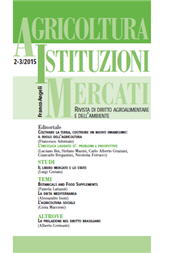L'agricoltura sociale : profili giuridici
154-176 p.
L'Estatuto da terra brasiliano del 1964 persegue il miglioramento delle strutture produttive dell'agricoltura anche attraverso l'attribuzione agli affittuari del diritto di "prelazione" dei fondi da essi coltivati qualora il proprietario intenda venderli. Questo strumento, che mira alla formazione di fondi rustici in proprietà di coloro che li coltivano, permette non solo realizzare la funzione sociale della proprietà, ma anche il perseguimento di fini di giustizia sociale.
Partendo da tale presupposto, l'articolo indaga, anche alla luce della sentenza del Superior Tribunal de Justiça del 2016, diverse questioni che attengono, di fondo, al problema di chi sia l'arrendatario che si vuole preferire, se un contadino (trabalhador do campo) o un "imprenditore agricolo" indipendentemente dalla sua forza economica e, in particolare: il significato da attribuire all'eguaglianza delle condizioni a cui l'esercizio del diritto di prelazione è subordinato; l'obbligo del prelazionante di esercitare il suo diritto su tutta la terra posta in vendita della quale il fondo affittato è solo una parte, nonché quello del proprietario di indicare lo specifico prezzo del fondo affittato che fa parte della maggiore area venduta. [Testo dell'editore].
The Brazilian Estatuto da terra of 1964 pursues the improving of agricultural production structures also by conferring to the tenants the preemptive right on the lands they grow, if the landowner wants to sell them. This legal instrument, that aims to have lands owned by those who actually grow them, allows not only to achieve the social function of the ownership, but also to pursue social justice aims. On this basis, the paper examines - also in the light of a recent judgemet (2016) of the Superior Tribunal de Justiça - different issues about the problem on who is the arrendatario to be preferred, if a farmer (trabalhador do campo) or an "agricultural entrepreneur", indipendently form their economic strength.
In particular, the paper focuses on: the meaning of "equality of conditions" on which the exercise of the preemptive right is subject to; the tenant's obligation to exercise his right on the whole land for sale, that involve also the rented land and the owner obligation to indicate the specific price of the rented land that is a part of the greater land for sale. [Publisher's Text].
Fait partie de
Agricoltura, istituzioni, mercati : rivista di diritto agroalimentare e dell'ambiente : 2/3, 2015-
Articles du même numéro (disponibles individuellement)
-
Informations
Code DOI : 10.3280/AIM2015-002010
ISSN: 1971-8373
DISCIPLINES
KEYWORDS
- Agricoltura sociale, agricoltura sociale e multifunzionalità, pluriattività, agricoltura sociale e integrazione, agricoltura sociale e sistemi agroalimentari, legislazione europea e nazionale
- Social Agriculture, Social Agriculture and Multifunctionality, Pluriactivity, Social Agriculture and Integration, Social Agriculture and Agri-Food System, European and National Legislation



